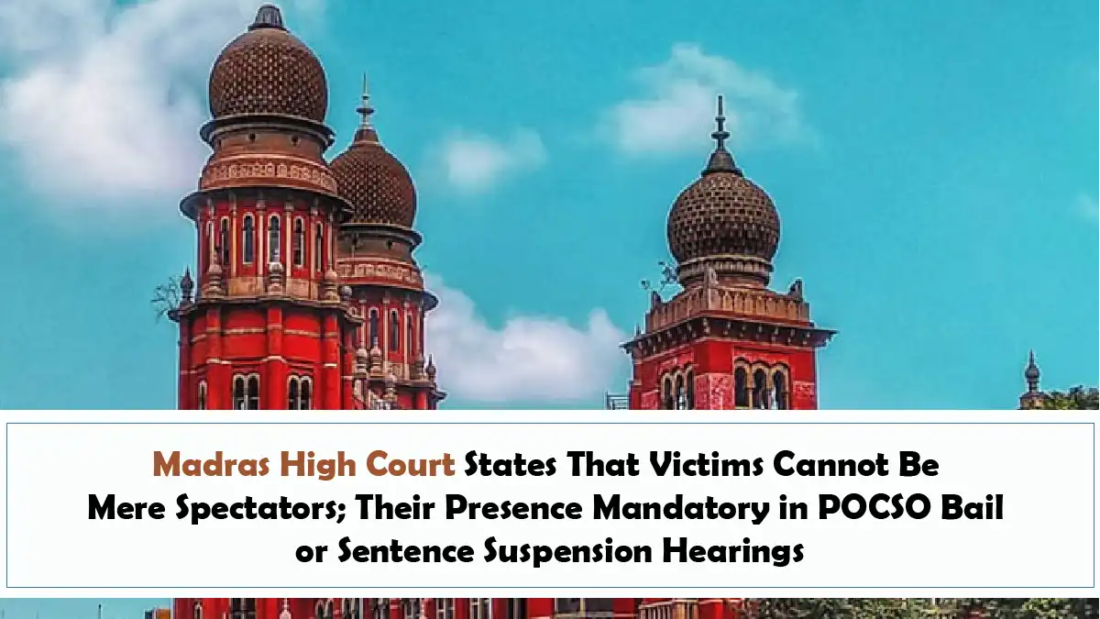Facts of the Case:
The present matter arose from three criminal appeals filed by appellants convicted under various provisions of the Protection of Children from Sexual Offences Act, 2012 (POCSO). Each appellant sought suspension of sentence under Section 430(2) of Bharatiya Nagarik Suraksha Sanhita (BNSS, 2023). During the hearing, the Madras High Court examined a significant procedural question: whether the de facto complainant or the victim is a necessary party to criminal appeals challenging convictions under the POCSO Act and in applications for suspension of sentence or bail.
Contentions of the Appellants:
The appellants contended that neither the POCSO Act nor the rules framed thereunder mandate the issuance of notice to the victim or her family in appeals or bail proceedings. It was argued that since the prosecution is conducted by the State, notice to the complainant or victim is not legally required. The appellants cited the Division Bench judgment of the Rajasthan High Court in Pooja Gurjar v. State of Rajasthan (2023), wherein it was held that while victims have a right to participate and be heard, they are not required to be impleaded as parties in bail applications or appeals. The appellants submitted that the right to be heard cannot be equated with a right to be made a party, and hence, impleadment of victims in such proceedings was unnecessary.
Contentions of the Respondent:
The State contended that victims or their guardians are entitled to notice and participation in criminal proceedings, especially in cases under the POCSO Act, which deals with offences of a sensitive nature. Relying on Jagjeet Singh v. Ashish Mishra (2022), Respondents argued that the Supreme Court has recognised the victim’s “unbridled participatory rights from the stage of investigation till the culmination of proceedings in appeal or revision.” It was submitted that in keeping with the evolving victimology jurisprudence, victims cannot be sidelined and must be informed and given an opportunity to participate, particularly before suspension of sentence or grant of bail.
Court’s Observations:
The Court undertook an extensive examination of victim participation under the POCSO Act and related jurisprudence. The Court began by reaffirming the principle that:
“The victim, or the child through their parent or guardian, cannot be treated as a passive spectator in criminal proceedings. Their right to be informed and to be heard is a facet of substantive justice.”
Additionally, the Court took a note of contradictory judgments from other High Courts. Jidgments from various High Courts, including Arjun Kishanrao Malge v. State of Maharashtra(Bombay HC), Akash Chandrakar v. State of Chhattisgarh, and Bibi Ayesha Khanum v. Union of India (Karnataka HC) emphasized that notice to victims or their guardians must be issued in bail or suspension of sentence proceedings under the POCSO Act, ensuring that they are informed and able to participate, either personally or through counsel or legal aid. However, the Court also took note of the contrary view of the Calcutta High Court in Ganesh Das v. State of West Bengal, which held that victims are not necessary parties in criminal appeals, as trials and convictions are primarily between the accused and the State.
The Madras High Court reconciled these views by drawing a distinction between impleadment and participation:
“While the victim may not be a necessary party to a criminal appeal, their right to be notified and heard before any order of suspension of sentence or bail is not only procedural fairness but a statutory recognition of participatory justice.”
Referring to Sections 39 and 40 of the POCSO Act, Rule 4 of the POCSO Rules, Section 439(1-A) CrPC, and Model Guidelines issued by the Ministry of Women and Child Development, he Court held that these provisions collectively recognize the victim’s right to be informed, heard, and represented in proceedings affecting their interests.
The Court further clarified that, although there is no statutory requirement to implead the victim or complainant as a respondent in criminal appeals, before granting bail or suspending a sentence, the court must issue notice to the victim’s parent, guardian, or de facto complainant, and afford them a fair opportunity to be heard. Additionally, the Court emphasized that the child victim should not be summoned or directly involved in court proceedings, and that their identity must remain protected.
Court’s order:
The Court therefore held that involving the victim’s parents, de facto complainant, or guardian is essential in both regular and appeal bail applications filed by individuals accused of POCSO Act offenses. Accordingly, the Court observed that the impleadment of victim or their parents is essential in regular bail applications under Section 483 BNSS (Section 439 Cr.P.C.) and suspension of sentence application under Section 430 BNSS (Section 389 Cr.P.C.,)
Written by Adv. Prerna Murarka
 Cart is empty
Cart is empty 

